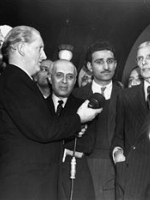Quaid-i-Azam Papers, National Archives of Pakistan, Islamabad, Pakistan
Archives of the Freedom Movement, University of Karachi, Pakistan
Syed Shamsul Hasan Collection, National Bank of Pakistan, Karachi, Pakistan
Quaid-i-Azam Academy, Karachi, Pakistan
India: The War Series, L/PJ/8/524, India Office Records, Asian and African Studies Reading Room, British Library St Pancras
Mountbatten ‘Top Secret’ Personal Reports as Viceroy, L/PO/433, India Office Records, Asian and African Studies Reading Room, British Library St Pancras
Private Secretary to the Viceroy on the Transfer of Power, R/3/1, India Office Records, Asian and African Studies Reading Room, British Library St Pancras
Rahmat Ali pamphlets, L/PJ/8/689, India Office Records, Asian and African Studies Reading Room, British Library St Pancras
Brabourne Collection, Mss Eur F 97, Asian and African Studies Reading Room, British Library St Pancras
Chelmsford Papers, Mss Eur E 264, Asian and African Studies Reading Room, British Library St Pancras
Christie Collection, Mss Eur D 718, Asian and African Studies Reading Room, British Library St Pancras
Cunningham Collection, Mss Eur D 670, Asian and African Studies Reading Room, British Library St Pancras
Fleetwood Wilson Papers, Mss Eur F 111 & 112, Asian and African Studies Reading Room, British Library St Pancras
Hailey Collection, Mss Eur E 220, Asian and African Studies Reading Room, British Library St Pancras
Halifax Collection (Irwin Papers), Mss Eur C 152, Asian and African Studies Reading Room, British Library St Pancras
Hallett Collection, Mss Eur E 251, Asian and African Studies Reading Room, British Library St Pancras
Hamilton Papers, Mss Eur D 510, Asian and African Studies Reading Room, British Library St Pancras
Linlithgow Collection, Mss Eur F 125, Asian and African Studies Reading Room, British Library St Pancras
Montagu Papers, Mss Eur D 523, Asian and African Studies Reading Room, British Library St Pancras
Mudie Diary, Mss Eur 28-34, Asian and African Studies Reading Room, British Library St Pancras
Reading (Lady) Collection, Mss Eur E 316, Asian and African Studies Reading Room, British Library St Pancras
Templewood (Hoare Papers) Collection, Mss Eur E 240, Asian and African Studies Reading Room, British Library St Pancras
Zetland (Lawrence Papers) Collection, Mss Eur D 609, Asian and African Studies Reading Room, British Library St Pancras
Cripps Collection, CAB 127/57-154, National Archives, Kew
Ramsay MacDonald Papers, PRO 30/69, National Archives, Kew
Alexander Papers, University of Cambridge
Baldwin Papers, University of Cambridge
Hardinge Papers, University of Cambridge
